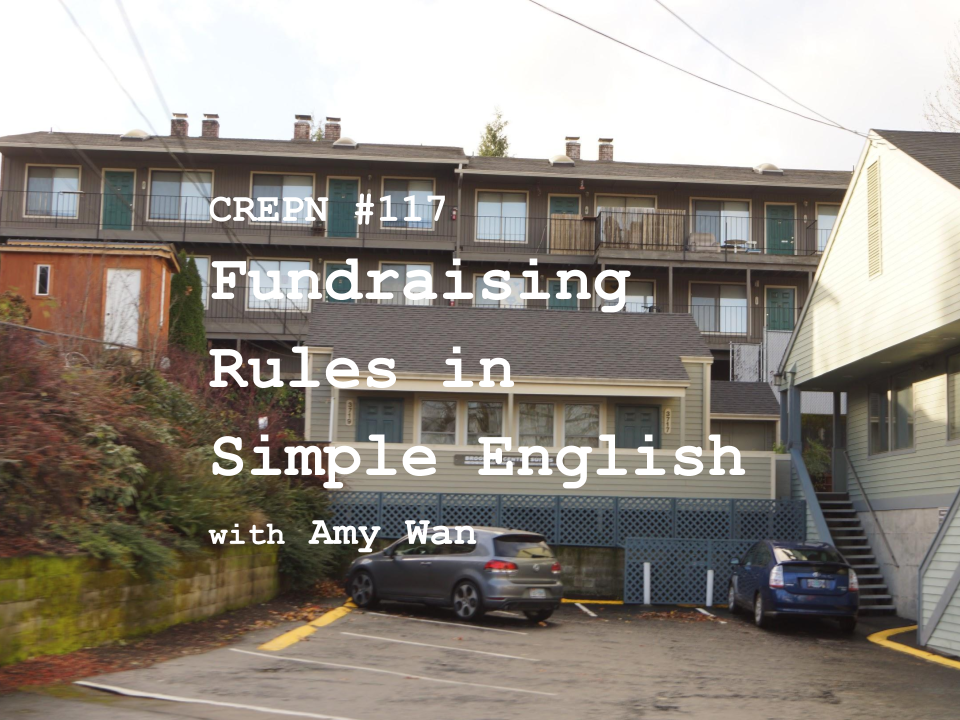
09 Nov CREPN #117- Fundraising Rules in Simple English with Amy Wan
Posted at 07:00h
in Podcast
[/x_audio_embed] Syndication is a popular real estate investment strategy for raising capital used by real estate syndicators. The legal cost to comply with the rules and regulations can be prohibitive. Failure to follow the rules can result in being classified as a “bad actor”. A Bad Actor can be prohibited from future involvement in SEC fundraising. Amy Wan started Bootstrap Legal, to simplify the legal process and reduce the cost for syndicators. Bootstrap utilizes technology to expedite the first draft process from client to attorney. This technology interface saves clients 10-15 hours of attorney time.
Popular Federal Fundraising Rules for Raising Capital
For discussion purposes, we will focus on the four most popular federal rules regarding raising money from a pool of passive investors for real estate investment. For each rule, we will look at:- Is there a limit of capital you can raise?
- Ability to market the offer and who you can market the offer to.
- Estimated cost to set up.
- Estimated time needed to set up.
- Is a Business Plan required?
- What type of financials required?
- What type of filing is required?
Regulation D Rule 506 B: This is the oldest rule regarding fundraising.
- There is no limit to the amount of money you can raise.
- You are NOT allowed to market to anyone you do not have a prior relationship with. If you have a pre-existing relationship, you can invite their participation. You can include as many accredited investors as you want and up to 35 non-accredited, sophisticated, investors.
- Estimated cost to set up for a $1M capital raise: $10k – $25k.
- This can take as little as little as a week to set up if you the sponsor, have all your information together.
- Do require a business plan.
- Requires certified financials.
- Form D must be electronically filed with the SEC.
Regulation D Rule 506 C: Adopted in 2013 from the JOBS Act.
- There is no limit on the amount of money you can raise.
- You are allowed to advertise your offer to anyone anywhere, but you can only accept funds from verified accredited investors.
- Estimated cost to set up for a $1M capital raise: $10k – $25k.
- This can take as little as a week if you are prepared and your attorney is available to crank it out.
- Does require a business plan.
- Requires certified financials.
- Form D must be electronically filed with the SEC.
Regulation Crowdfunding: Created by JOBS Act and adopted in 2015.
- You can raise up to $1,070,000 in any 12 month period. Great option for a beginner looking for $1,000,000!
- You can advertise and take money from anyone including non-accredited investors.
- Does require a business plan.
- You must have financial statements and legal documents.
- Offer must be listed on a FINRA listing.
- Estimated cost range to set up $5k in legal + $2k for Financials + Listing Service fee (4 – 10% of raise)
- Estimated time needed; as quickly as you can provide the information to your attorney.
- Form C must be electronically filed with the SEC.
Regulation A+: Created by JOBS Act and adopted in 2015.
- You can raise up to $50M in any 12 month period.
- You can advertise and accept investments from anyone including non-accredited investors. It is best for those who have a large network or audience.
- This process takes 4 to 6 months. It is best suited for a fund, ie: online REIT.
- Does require a business plan.
- Requires Audited Financial Records and legal documents.
- You have to submit to a qualification process with the SEC.
-
- Rule 506 b & c: https://www.sec.gov/fast-answers/answers-rule506htm.html
- Regulation Crowdfunding: https://www.sec.gov/info/smallbus/secg/rccomplianceguide-051316.htm
- Regulation A+: https://www.sec.gov/news/pressrelease/2015-49.html

